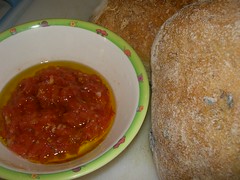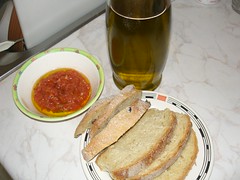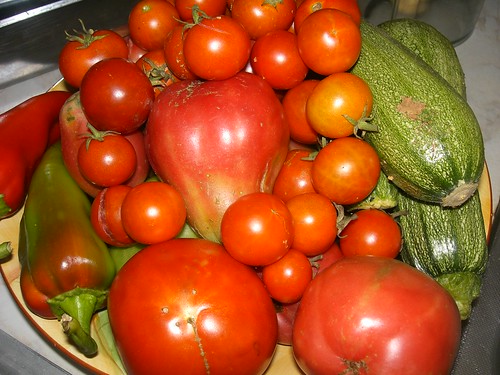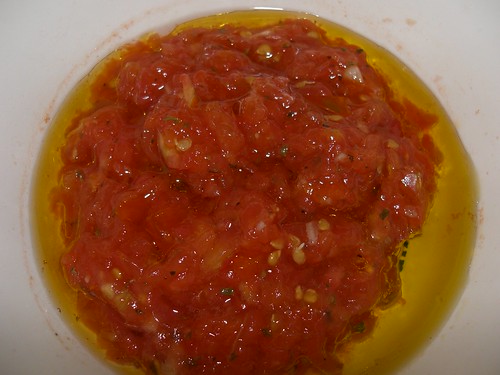Bread and water - basic food: "Plain fare gives as much pleasure as a costly diet, while bread and water confer the highest possible pleasure when they are brought to hungry lips." Epicurus (341?-270 BC). Thankfully, in Crete, by the early 19th century, most people could add something more substantial to this simple fare: olive oil.
In the good old days when all Cretans ate a Mediterranean diet based on seasonal availability, and poverty reigned, meaning that everyone had to at least source their food in some way to keep themselves fed in order to survive (as well as doing a heap of other chores), when someone did not want to eat the main meal that a Cretan mama had cooked for her (usually much larger than the current average of less than 1.5 children per) family, they ate psomi me ladi, bread dipped in oil, the meal of choice for the poorest farming communities - and only if there was enough bread in the house. My husband's grandmother had told him of times when her children (including his father) 'stole' a slice of the bread she had cooked for that day, and she would chase after them to get it back if she could, so that she could offer it to accompany lunch or dinner. (The children would clamber up trees to escape their mother's wrath.)
Despite its humble looks and origins, psomi me ladi sustained the Greek people for many years. The famine that killed thousands in Athens during WWII did not affect the Cretans in the same way. In the capital city of Athens, people had no access to bread and oil. They had money, but could not buy anything with it because there was no food available during the Nazi occupation. This was not exactly the case in Crete. I remember my father saying that bread and oil were always available in his village, since most people produced their own oil and as long as the Germans weren't taking their livestock, they could trade some chickens and eggs for flour. If they got hungry, it's because there wasn't enough food to go round because the families were large. In his case, his father had been killed on the first day of the Battle of Crete, and his mother had a hard time scraping up enough food for her five children.
My late father-in-law came from a family of ten children. If he were alive today, here's what he would probably be telling his grandchildren about dinner time in his home in Fournes:
"I was brought up in a family with ten children. At that dining-table at home one lax moment and half my dinner could be gone to my neighbour. I learned to eat quickly while defending my plate with a protective arm." (Small Island by Andrea Levy)
But even Gilbert becomes a fussy eater when he is confronted with tasteless food:
"But with this English food I sat back, chewed slowly and will ed my compatriots to thieve. I had not yet seen a war zone but if the enemy had been frying up some fish and dumpling, who knows which way I would point my gun?" (Small Island by Andrea Levy)
They may not always have had shoes to wear, they may not have had pencils and paper to go to school with (my mother had a piece of broken slate and chalk), but they always had something to eat that would give them energy. If they had psomi me ladi, they had the energy needed to work in the fields, under the hot sun, dig up the soil, plant trees, and gather crops. Fruit and vegetables were always available according to the season, but that's not what kept people active:
"No one carried a pound of superfluous flesh, in spite of the vast quantities of starchy food. They expended every ounce they ate in work... Vegetables and fruit were eaten because they were good for you, but it was the bread, potatoes, meat and floury puddings which staved off exhaustion." (The Thorn Birds by Colleen McCullough)
My mother's village, located at the foothills of the high peaks of Lefka Ori, could only grow crops that didn't require irrigation. Tomatoes were grown without ever being watered, save one single time when they were planted. These tomatoes grew right throughout the summer. At the end of their growing period, they were cut in bunches and hung onto the rafters of the roof in the stone cottages. These tomatoes just as they were, slightly shriveling but not drying completely, right throughout the winter. The villagers were never without tomatoes all year round, despite not having refrigerators. They had one more ingredient to add to their basic bread and oil.
My green-finger uncles insist that this method of preserving tomatoes has ceased to exist; times have changed, there is more pollution in the soil, air and water, and plants are not grown in the way they traditionally were grown, using only natural fertilisation and no chemical additives. Not only do tomatos not keep well using this system; in Crete, they no longer grow without irrigation.
In the good old days when all Cretans ate a Mediterranean diet based on seasonal availability, and poverty reigned, meaning that everyone had to at least source their food in some way to keep themselves fed in order to survive (as well as doing a heap of other chores), when someone did not want to eat the main meal that a Cretan mama had cooked for her (usually much larger than the current average of less than 1.5 children per) family, they ate psomi me ladi, bread dipped in oil, the meal of choice for the poorest farming communities - and only if there was enough bread in the house. My husband's grandmother had told him of times when her children (including his father) 'stole' a slice of the bread she had cooked for that day, and she would chase after them to get it back if she could, so that she could offer it to accompany lunch or dinner. (The children would clamber up trees to escape their mother's wrath.)
Despite its humble looks and origins, psomi me ladi sustained the Greek people for many years. The famine that killed thousands in Athens during WWII did not affect the Cretans in the same way. In the capital city of Athens, people had no access to bread and oil. They had money, but could not buy anything with it because there was no food available during the Nazi occupation. This was not exactly the case in Crete. I remember my father saying that bread and oil were always available in his village, since most people produced their own oil and as long as the Germans weren't taking their livestock, they could trade some chickens and eggs for flour. If they got hungry, it's because there wasn't enough food to go round because the families were large. In his case, his father had been killed on the first day of the Battle of Crete, and his mother had a hard time scraping up enough food for her five children.
My late father-in-law came from a family of ten children. If he were alive today, here's what he would probably be telling his grandchildren about dinner time in his home in Fournes:
"I was brought up in a family with ten children. At that dining-table at home one lax moment and half my dinner could be gone to my neighbour. I learned to eat quickly while defending my plate with a protective arm." (Small Island by Andrea Levy)
But even Gilbert becomes a fussy eater when he is confronted with tasteless food:
"But with this English food I sat back, chewed slowly and will ed my compatriots to thieve. I had not yet seen a war zone but if the enemy had been frying up some fish and dumpling, who knows which way I would point my gun?" (Small Island by Andrea Levy)
They may not always have had shoes to wear, they may not have had pencils and paper to go to school with (my mother had a piece of broken slate and chalk), but they always had something to eat that would give them energy. If they had psomi me ladi, they had the energy needed to work in the fields, under the hot sun, dig up the soil, plant trees, and gather crops. Fruit and vegetables were always available according to the season, but that's not what kept people active:
"No one carried a pound of superfluous flesh, in spite of the vast quantities of starchy food. They expended every ounce they ate in work... Vegetables and fruit were eaten because they were good for you, but it was the bread, potatoes, meat and floury puddings which staved off exhaustion." (The Thorn Birds by Colleen McCullough)
My mother's village, located at the foothills of the high peaks of Lefka Ori, could only grow crops that didn't require irrigation. Tomatoes were grown without ever being watered, save one single time when they were planted. These tomatoes grew right throughout the summer. At the end of their growing period, they were cut in bunches and hung onto the rafters of the roof in the stone cottages. These tomatoes just as they were, slightly shriveling but not drying completely, right throughout the winter. The villagers were never without tomatoes all year round, despite not having refrigerators. They had one more ingredient to add to their basic bread and oil.
My green-finger uncles insist that this method of preserving tomatoes has ceased to exist; times have changed, there is more pollution in the soil, air and water, and plants are not grown in the way they traditionally were grown, using only natural fertilisation and no chemical additives. Not only do tomatos not keep well using this system; in Crete, they no longer grow without irrigation.
I still tell my fussy eaters that they can have some bread and oil if they don't want to eat what I've cooked. For example, today, we're having fish soup, not a popular choice with everyone. If they want something else, they'll have to learn to cook it themselves, which the children still can't do because they are too short to reach the cooker. Although their father is taller than me, which means he can reach the cooker easily, when it's his turn to cook, this is in fact what he makes for the children: a slab of slightly toasted sourdough bread, coated in oil and freshly grated tomato. (I know what my son will be cooking when he is tall enough to stir a pot and use the gas cooker: plain boiled pasta. )
Psomi me ladi can be dressed up with that most humble-looking red fruit, a basic food item for many Cretans: freshly grated tomato. Here's a slightly sharp-tasting sauce that combines tomato and olive oil with some herbs and spices, to make a great dip for thickly sliced sourdough bread.
1 large tomato, grated
1-2 cloves of garlic, according to taste
olive oil
salt
oregano seasoning
Drain the grated tomato of its excess liquids. Add the salt to the grated tomato, and let stand in a fine sieve until more liquids drain away. Chop the garlic finely and add this with the oregano to the strained tomato in a small wide bowl. Drizzle some olive oil over the tomato. Use this dip with slices of fresh sourdough bread (optionally toasted), as a snack or a light meal, accompanied by some cheese. Heaven...
This is my entry for Kalyn's Weekend Herb Blogging, hosted this week by Susan from The Well Seasoned Cook.
©All Rights Reserved/Organically cooked. No part of this blog may be reproduced and/or copied by any means without prior consent from Maria Verivaki.




I LOVE this. I would want to eat this PLUS my dinner! :-) I've always loved a nice, crusty slice of bread with olive oil and tomato. My grandma offered bread at every meal. We ate salad last, and the bread was used to soak up any of the juices left in the tomato or salad bowls. Oh, it was sooo good. Your harvest looks terrific, too.
ReplyDeleteMy grandma calle it riganada! I loved it and still do. I coul basically eat it everyday...
ReplyDeleteThis would be a perfect meal for me.I love to soak up the juices of garden ripened tomatoes with homemade bread. When I grew tomatoes, before the first frost, I would hang the plants upside down in the root cellar and the green unripened tomatoes would ripen just as though they were still plasnted in the garden. They wouldn't last as you mentioned but it was a way to prolong their growing season during our cold winter climate.
ReplyDeletethat sauce looks delicious. :O
ReplyDeleteIf the tomatoes are garden ripe, why not? This looks simply delicious.
ReplyDeleteThis is very timely for me. I had a few nice but aging tomatoes I needed to chop up the other night because dinner was going to be elsewhere. I "preserved" them in the fridge with vinegar. Tonight I am going to make something similar to your dish, my own version of panzanella. I use tomatoes, vinegar, good oil from Selino or somewhere else in Chania, old sourdough from Acme Bread (you can google it), or maybe their walnut levain, which I am hooked on, and Italian parsely. Have it with feta and olives on the side. Yumm.
ReplyDeleteYes, we are VERY spoiled here in N California. We can buy dry-farmed tomatoes. And if you ever go to Santorini (which is so much more than the sum of the views) try theirs. They are grown in the volcanic soil and are perfect little wonders. Thank you!
I also love a crusty bread, drizzled with olive oil, and covered with thick slices of tomato.
ReplyDeleteI think I will make some of your sauce, as this also sounds delicious.
Poor man or not - this is fit for a king!
ReplyDelete-DTW
www.everydaycookin.blogspot.com
This is beautiful and delicious!! Reading your post makes me thing of how my family was when i was a kid. I didnt came from a big family but the meager resources of my parents made it hard for us to have soemthing to eat everyday but the funny thing we never felt we are deprived of anything because our parents showered us with love :-)! what a lovely post!
ReplyDeleteI agree with Paula, I'd eat this as well as dinner, not as an alternative! The simple meals sometimes just are the best - my mouth is watering just looking at the pictures. And the old method of keeping tomatoes throughout the winter was fascinating- what a shame it can't be used any more.
ReplyDeleteYour father's comment about being "lax" during dinner reminds me so much of my father. He was from a family of 14 and very poor in Puerto Rico. I still haven't seen anyone eat as fast as my father!
ReplyDeleteI love a tomato/oil combo, it's my favorite. What a great post!
That looks quite yummy!
ReplyDeleteI also want to say, you are so sweet to comment on my blogs!
This looks SOOO yummy. I'll try it when I get back home. I've been gone 2 days, and my husband had to pick tomatoes today and take them to work so they would not be wasted. I can hardly wait for this one!
ReplyDeleteWith beautifully simple, fresh ingredients, there is no reason to reach for convenience food.
ReplyDeleteLovely, Maria. Thank you for joining in WHB this week!
What a simple, yet beautiful, recipe. Thank-you for sharing!
ReplyDeleteThank you for sharing your (parent's) story, thank you for sharing this lovely and simple dish. I, too wish for the old times when the air is clean and the land is rich.
ReplyDeleteI have to laugh at the description of growing up in a family of ten. We had ten kids too, and although we always were lucky to have plenty of food, there were certain things you never got as much of as you wanted. Great post. It's interesting how bread and good olive oil is offered in some of the finest restaurants in America as a starter. Simple but perfect, no matter when it's served, and the tomato would add a wonderful extra flavor.
ReplyDelete